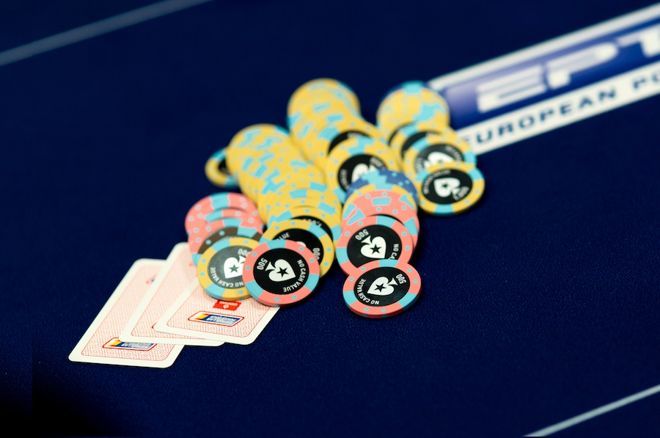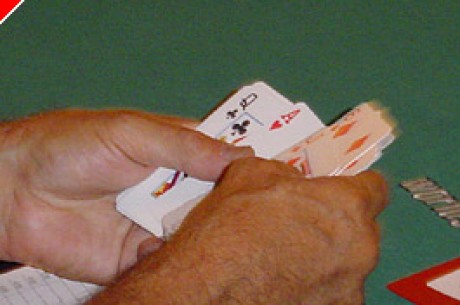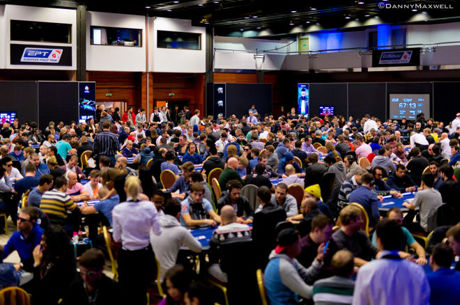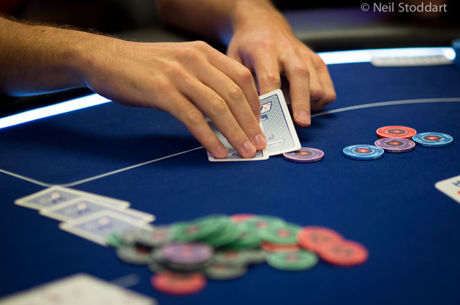Stud Poker Strategy - Betting on the Come

When you're playing poker against those who tend to be too loose, it's generally correct to wait until you have a hand that is likely to be ahead in value before you bet aggressively. If your opponents will pay you off when you make a strong hand, then there's really no reason to push borderline or inferior hands. Wait until you have the goods, bet them aggressively when you get them, and collect the bets from your hapless opponents who call you down to the River with weaker hands. What could be easier?
The problem is that as you progress and play with opponents who are increasing disciplined, they, like you, will recognize when they are behind and concede as they should. Unlike lesser skilled opponents, if you raise on Third Street with a pair of Aces and an Ace showing, they will fold with their pair of Jacks. When you bet with your Third exposed suited card on Sixth Street they will not feel compelled to call, just to keep you honest, but will fold much of the time, giving you credit for the Flush.
Against these players, you must employ some deception. One of those deceptive plays is called "betting on the come". It is betting when you have a strong draw, even if you have nothing else of value if you don't hit your hand.
Here's the simplest example. You have a 4-Flush in four cards. You are high with a Jack showing against one opponent. You bet. Your bet isn't a present-value bet but a future value bet. You figure to make your Flush 50% of the time or so. So your hand has considerable potential. You want your opponent to call - so it's not a semi-bluff or bluff since about half the time you'll make your flush and win.
Against a perceptive opponent you are likely to make more money in this way than you would if you just checked and waited until you made your flush before you bet. That's because your opponent will be less likely to give you credit for making your flush if you do hit a suited card. And he may give you credit for a hand that he can't beat if you don't hit your Flush but hit something that only looks scary. Here's an example of that.
You have (9♥3♥) 4♥ J♥ on Fourth Street.
Your opponent has (x x) 6♣ Ts on Fourth Street.
You bet $10 and he calls.
If you catch another heart on Fifth Street with (9♥ 3♥) 4♥ J♥ 2♥ and you bet, what is your observant opponent likely to think? He'll have to ask himself why you bet on Fourth Street if you only had a 4-Flush. He will be more likely to think that your bet meant that you got a pair of Jacks or maybe two pair on Fourth Street. Otherwise, you would have checked. With a pair or two pair on Fourth, a third suited up card couldn't have given you a Flush. So if he a strong hand or a good draw, he's more likely to call you down than if he read you for a made Flush.
Similarly, think about what your opponent is likely to think if you hit another Jack or another 4 with that hand. He may well concede on Fifth with either of those cards because he'll give you credit for Trips or Two Pair. This effectively increases the cards with which you can win the hand - something you always like to do if possible.
Here's a hand from a $10/20 game I was in the other day. I had A♠J♣Ts on Third Street. I called a raise that was called by two people in front of me. On Fourth I got the Qs. It was checked to me. I bet. I didn't have a made hand but I knew that it would be tough for my opponents to call me on Fifth Street if I caught either a Q or a J. And I knew at the same time that if I caught an Ace I'd be likely to be in the lead, and might get everyone to fold because of the straight possibility. And if I got one of the four monster cards that I wanted, a King, I would surely be in the lead and might get some callers to go with me to the River when I bet.
Sure enough, I got one caller on Fourth. On Fifth I caught a King. My betting had convinced my opponent that I didn't have the straight. And so, as hoped, he called me down to the River and I won a very nice pot. Had I just checked and called on Fourth with my inside straight draw my Fifth Street catch would have looked much more like a straight and my opponent may well have folded for the $20 bet. The way I bet it, I extracted another $60.
These opportunities come up regularly in Stud. But you have to be very careful. You must not start betting on the come just because you can. There are two reasons for this. First of all, if you start betting aggressively every time you have a draw, your opponents will notice and they will start raising you more frequently - something you don't want. This is especially true when the pot is heads up. For example, in a $10/20 game, while a bet of $10 when you have a very live 4-Flush on Fourth Street may make sense, a $20 bet - the cost of a bet and a raise, generally doesn't make sense.
It's also true that your bet doesn't make as much sense if your drawing hand doesn't have at least some additional outs to make a semi-strong hand. Here's an example of that.
On Third Street you're dealt the ( 9♣ Q♣) 4♣. You see around the table the following cards, starting from your left.
Q♠, 9♦, 3♥ J♥ 7♠ A♠
There are no clubs. Maybe you should raise on the come?
No, don't.
First of all, a 3-Flush on Third Street has only a relatively small chance of making a Flush - about 5:1 with no knowledge of the other cards, about 4:1 against given that there are no other suited cards that are visibly out. So your raise isn't a value bet - you don't have enough of a chance of winning by drawing a flush to warrant a bet.
Sometimes, though, the chance that you might improve in some other way may warrant a bet - as it increases the number of cards that can improve your chances of winning. That's not the case here, as your Queen is partially dead as is your 9.
In this hand, the only way you'll win is most likely to be if you catch two suited cards. You want the pot to be as big as possible in the unlikely even that this occurs. The way to insure this is by calling the bring-in, not by raising.
Betting on the come is sometimes combined with a bluff to make a semi-bluff - a chance that your opponents' will fold to your bet added to the chance that you might improve to the leading hand on the next card. But this is done when there is at least some expectation and hope that your opponents will fold when you make your bet or raise. That's unlikely in this example. Your exposed card, the 4c, is too low to scare many opponents into folding.
The bottom line, as with all deceptive moves, is that you must pick you spots. In the future, I'll write more about table image - for yourself and for your opponents --, to give you an even better sense of when these deceptive moves make the most sense.
Ed Note: Paradise Poker have Stud action around the clock








